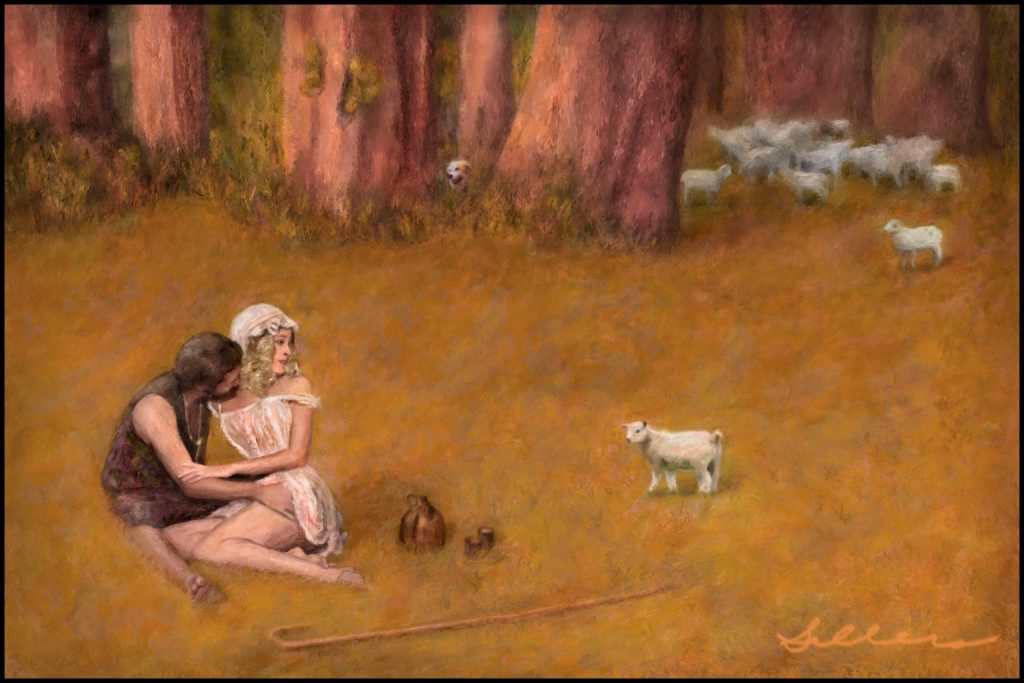Temptation Of Little Bo Peep by Bob and Donna Sellers

Bo Peep’s Moment by Bob Sellers
Up along the ocean north, Coast Redwoods trees become the world’s tallest, some over 1,000 years.
Bo Peep brings her flock to a grassy, redwood meadow deep. A boy she thinks is Eric or Aaron brings a jug. Red wine she hopes.
Lazlo, a loyal Austrian Shepard dog, the master of the flock, sinks softly into the grass between two ancient trees to watch Bo and her possible lover create an intimacy to express the desire she feels. Bo has a conscious intent to surrender her virginity. Feeling urgent.
Watson, a British cricket hides in the deep grass beneath the redwoods close to Lazlo. Watson’s Alarmed! “ Bark at them. Stop them Lazlo,” screams Watson the cricket. “That boy’s going rape Little Bo Peep,” he cries.
“You, Watson, are so wrong,” argues Lazlo. “ Bo wants this moment. See her hair, so curly and blond, and the sexy outfit. She is in her Butterfly stage of life–to attract a mate. Her sexual energy is all that she feels. It’s irresistible.”
“If so, it will bring a sadness to the world,” Watson explains. “We know Bo from the nursery rhyme. Mothers, grandmothers, children and members of the sheep herding culture know Bo as ‘little Bo Peep,’ an innocent, a virgin, pure and sweet. Bo Peep’s only flaw is that once she lost her sheep. Now she is going to lose her virginity. She’s just not allowed. Stop her Lazlo! Before they go too far.”
“Nature wins,” shouts Lazlo and rushes forward to herd the little white lamb back to the flock. Romance happens.
“Good dog Lazlo, good boy,” whispers Eric or Aaron.
Interpretation by Donna Sellers
Temptation of Little Bo Peep is a story that may represent a conflict between Bo Peep and her boyfriend and the little white lamb standing nearby wanting her attention. This story may be viewed as a metaphor, relating to women who have children or some other responsibility creating conflict that make it difficult to enjoy the romance that is possible for them at the time because there is something blocking them. The way someone projects their imagination into the story might help to reveal underlying variables that may be involved in this conflict, while suggesting how they might be resolved. The deeper issue they may have becomes more visible and available to resolution by changing the story in their imagination.
This approach can help you to get to the underlying issues involved and may be totally surprising. For example, you might hear your Mother’s or your Father’s voice inside your head warning you about a romantic relationship. “You know men are only after one thing!” or, “You better not ignore your responsibilities for the family!” The inner voices you carry around in your head may not even be conscious. However, they can be powerful enough to interrupt the flow of what is happening at the moment. When you role-play or write about a character that is NOT YOU, you set aside the usual inner voice that may have been programmed by significant people in your life. It may not be your neighbor or your mother’s voice that gets in the way but some other person or persons who have had a significant impact upon you at some time in your life. These inner voices and thought forms can be powerful enough to interrupt the flow of what may be occurring in the moment.
A therapist might ask the client, “Can you remember the first time you heard this voice? What was happening at the time?” You may be acting out your feelings inappropriately, with the same intensity of feeling you had a very long time ago as though it is just happening for the first time. Once you realize you are not in present time, you have an opportunity to see the bigger picture and modify your response.